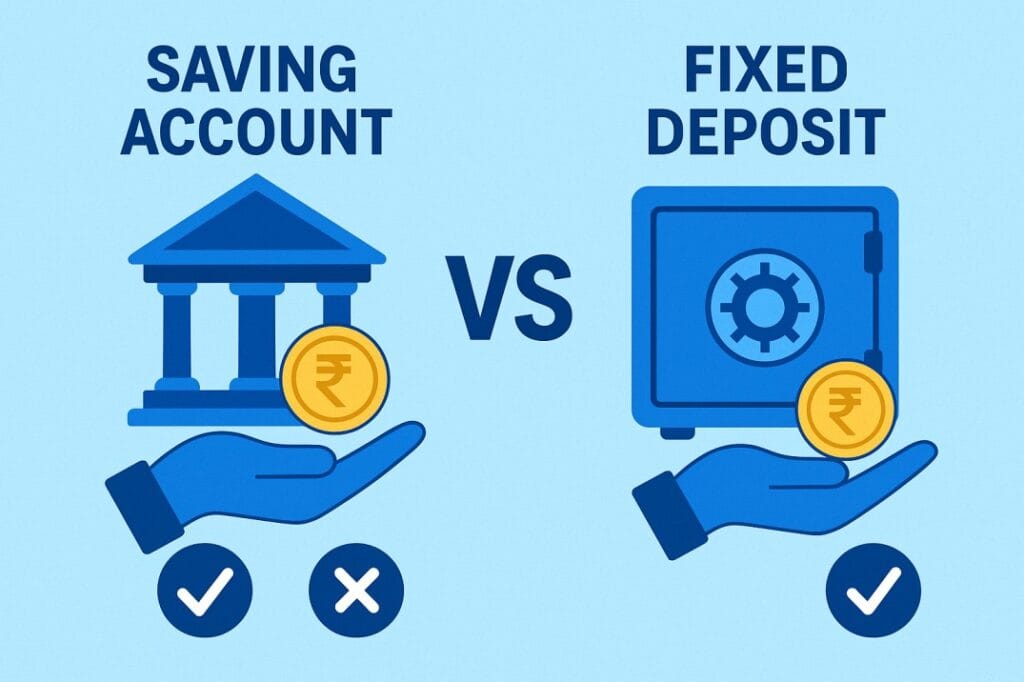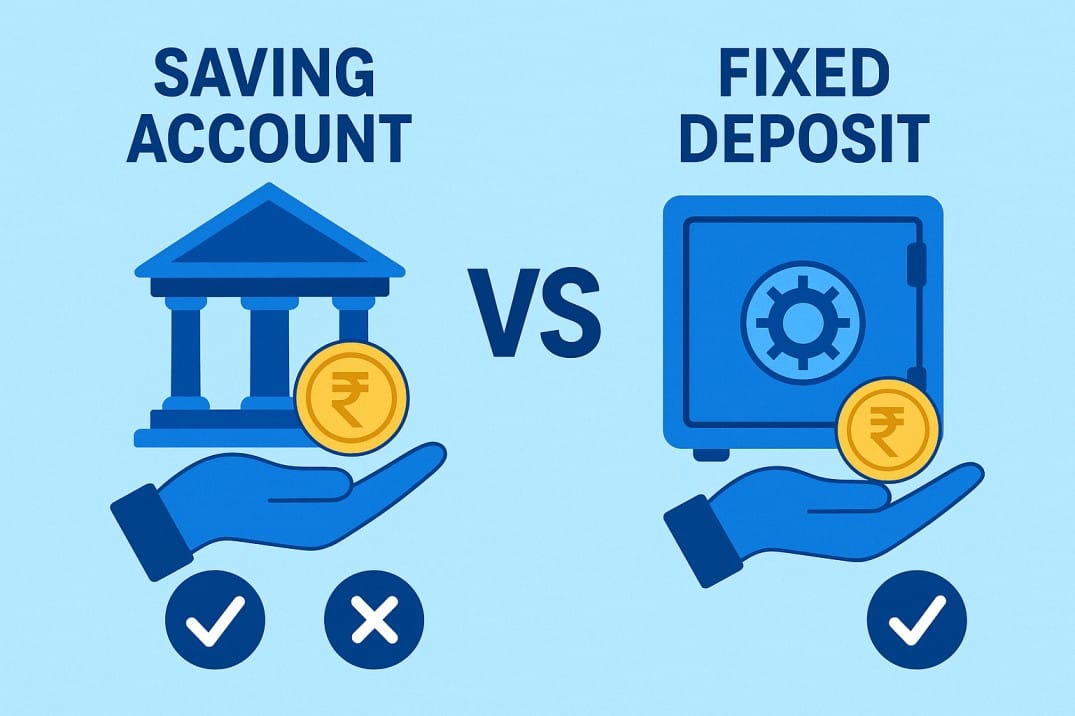
Aaj ke samay me Saving Account vs Fixed Deposit ka comparison bahut logon ke liye important ho gaya hai. Har kisi ke dimaag me ye sawal hota hai ki apni mehnat ki kamai ko kahan park karein – ek (SA) me ya phir ek (FD) me. Dono options ke apne-apne fayde aur nuksan hain. Lekin in dono me se kaun sa option aapke liye better hoga, ye depend karta hai aapke financial goals, liquidity need aur risk tolerance par.
Is detailed blog me hum Saving Account vs Fixed Deposit ke beech ka difference samjhenge, dono ke pros and cons dekhenge, aur ye bhi jaanenge ki kis situation me kaunsa option best hai.
1. Saving Account vs Fixed Deposit – Basic Understanding
Sabse pehle humein dono financial products ko samajhna hoga.
- Saving Account: Ye ek regular bank account hota hai jisme aap apne paise safe rakhte hain aur us par thoda interest earn karte hain. Saving account ka main benefit hota hai easy liquidity aur har waqt paisa withdraw karne ki facility.
- Fixed Deposit (FD): FD ek investment product hai jisme aap ek fixed tenure ke liye paisa deposit karte ho aur us par ek fixed interest earn karte ho. FD ko ek safe aur stable return dene wala option mana jata hai.
Saving Account vs Fixed Deposit ke beech yahi primary difference hai – ek me liquidity high hai aur doosre me return zyada.
2. Saving Account ke Fayde
Jab baat Saving Account vs Fixed Deposit ki hoti hai, toh sabse pehle hum saving account ke benefits dekhte hain:
- Liquidity – Saving account me paisa hamesha available hota hai. ATM, UPI, cheque ya net banking se aap apne paise kabhi bhi nikal sakte ho.
- Safety – Saving account me paisa safe hota hai kyunki banks par RBI ka regulation hota hai.
- Emergency Friendly – Agar aapko turant paisa chahiye toh saving account best option hai.
- No Fixed Tenure – FD ke tarah yahan koi lock-in period nahi hota.
- Digital Access – Aaj ke digital zamane me saving accounts me online banking, UPI, debit card jaise features hote hain.
Isliye Saving Account vs Fixed Deposit me agar aapko liquidity chahiye toh saving account better hai.
3. Saving Account ke Nuksan
Har financial product ke kuch drawbacks bhi hote hain:
- Low Interest Rate – Saving accounts par interest rate sirf 2.5% se 4% ke beech hota hai.
- Inflation Effect – Inflation ko dekhte hue saving account ke returns kam hote hain.
- Extra Charges – Minimum balance maintain na karne par penalty lag sakti hai.
Yahi wajah hai ki Saving Account vs Fixed Deposit me return ke mamle me saving account weak hai.
4. Fixed Deposit ke Fayde
Ab chaliye Fixed Deposit (FD) ke benefits dekhte hain:
- Higher Interest Rate – FD par generally 6% se 8% tak interest milta hai jo saving account se zyada hota hai.
- Guaranteed Returns – FD me market risk nahi hota, isliye aapko fixed return milta hai.
- Flexible Tenure – FD 7 din se lekar 10 saal tak ke liye banaya ja sakta hai.
- Loan Facility – FD ke against loan bhi liya ja sakta hai.
- Safe Investment – FD ek risk-free investment mana jata hai.
Saving Account vs Fixed Deposit me agar baat returns ki ho, toh FD hamesha strong option hai.
5. Fixed Deposit ke Nuksan
Lekin FD me kuch limitations bhi hain:
- Liquidity Issue – FD ka paisa lock-in hota hai, premature withdrawal par penalty lagti hai.
- Taxable Interest – FD ke interest par tax lagta hai jo overall return ko kam kar deta hai.
- Inflation Risk – Kabhi-kabhi inflation FD ke interest ko bhi cross kar jata hai.
Isliye Saving Account vs Fixed Deposit me FD har situation me perfect nahi hota.
6. Saving Account vs Fixed Deposit – Interest Rate Comparison
- Saving Account Interest Rate: 2.5% – 4% per annum
- Fixed Deposit Interest Rate: 6% – 8% per annum
Clearly, Fixed Deposit ka return saving account se double ya kabhi-kabhi triple hota hai. Lekin liquidity ke case me Saving Account ka advantage hai.
7. Saving Account vs Fixed Deposit – Kaun Kis Situation Me Better Hai?
- Short-Term Need: Agar aapko daily expenses ya emergency ke liye paisa chahiye toh Saving Account best hai.
- Long-Term Saving: Agar aap apna paisa 1–5 saal ke liye park karna chahte ho toh Fixed Deposit better hai.
- Risk-Free Investment: Market risk avoid karna chahte ho toh FD choose karo.
- Flexibility: Har waqt paisa withdraw karna hai toh saving account choose karo.
8. Taxation in Saving Account vs Fixed Deposit
- Saving Account Interest: Saving account par earned interest ₹10,000 tak tax-free hota hai (Section 80TTA).
- Fixed Deposit Interest: FD par earned interest puri tarah taxable hota hai aur TDS bhi deduct hota hai agar ₹40,000 se zyada ho.
Isliye tax ke perspective se bhi yeh dono alag impact create karte hain.
9. Saving Account vs Fixed Deposit – Seniors ke Liye
Senior citizens ke liye FD aur bhi beneficial hota hai kyunki banks unhe extra 0.5% interest rate dete hain. Lekin unke liye bhi ek active saving account zaroori hota hai taaki liquidity bani rahe.
10. Kaunsa Choose Karein – Saving Account ya Fixed Deposit?
Ab sabse important sawal – Saving Account vs Fixed Deposit me se kaunsa better hai?
Answer simple hai: Dono ka apna role hai.
- Agar aapko liquidity aur daily usage chahiye toh Saving Account zaroori hai.
- Agar aapko safe aur guaranteed higher return chahiye toh Fixed Deposit sahi choice hai.
Best financial planning ke liye dono ka combination banana chahiye. Ek portion hamesha saving account me rakho aur baaki ko FD me invest karo.
11. Expert Advice on Saving Account vs Fixed Deposit
Financial experts suggest karte hain ki:
- Apna 3–6 months ka emergency fund saving account me rakho.
- Baaki long-term savings ko FD me park karo.
- Inflation ko beat karne ke liye kuch paise mutual funds ya other investments me bhi invest karna chahiye.
12. Conclusion
End me kahin toh ye clear hai ki Saving Account vs Fixed Deposit ek doosre ke competitor nahi, balki complement hain. Saving account aapko flexibility aur liquidity deta hai, jabki fixed deposit aapko higher returns aur stability provide karta hai.
Aapko decide karna hoga ki aapke goals kya hain:
- Agar aapko har waqt paisa chahiye toh Saving Account choose karo.
- Agar aap safe aur stable return ke saath apni savings badhana chahte ho toh Fixed Deposit best hai.
Best strategy hai dono ka smart combination use karna. Isi tarah aap apne financial goals ko balance kar paoge aur apne future ko secure bana paoge.

